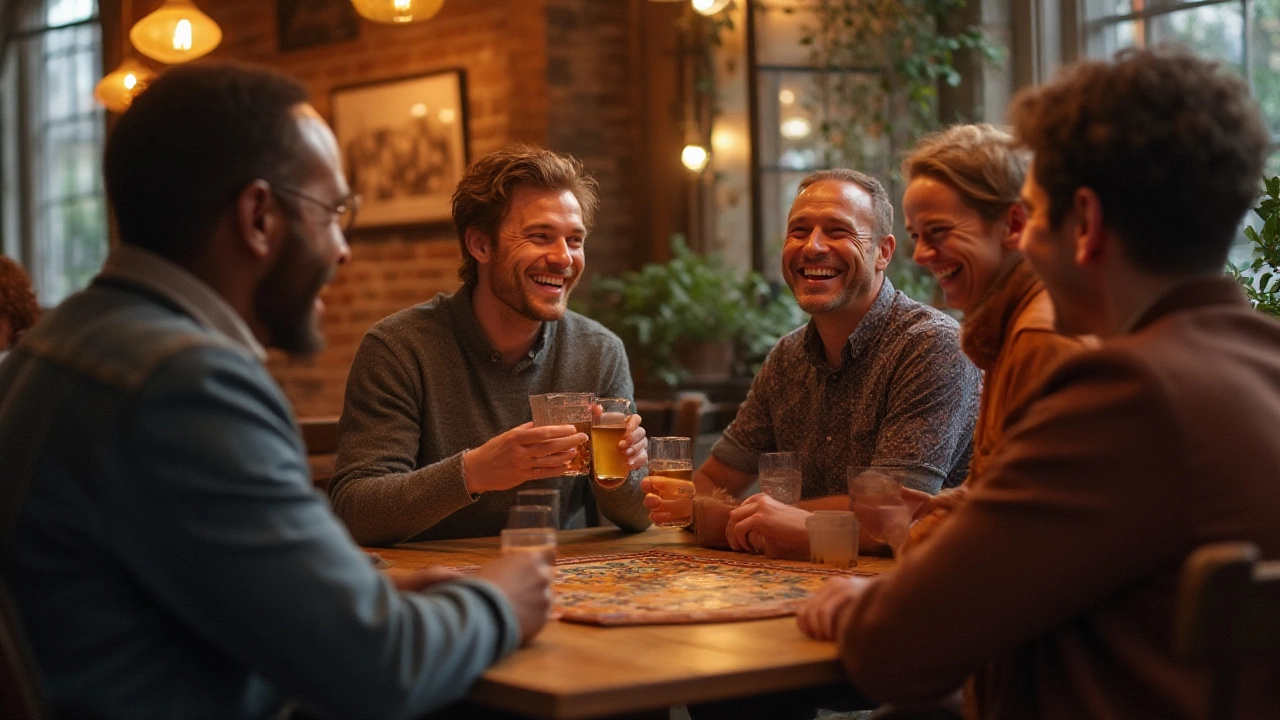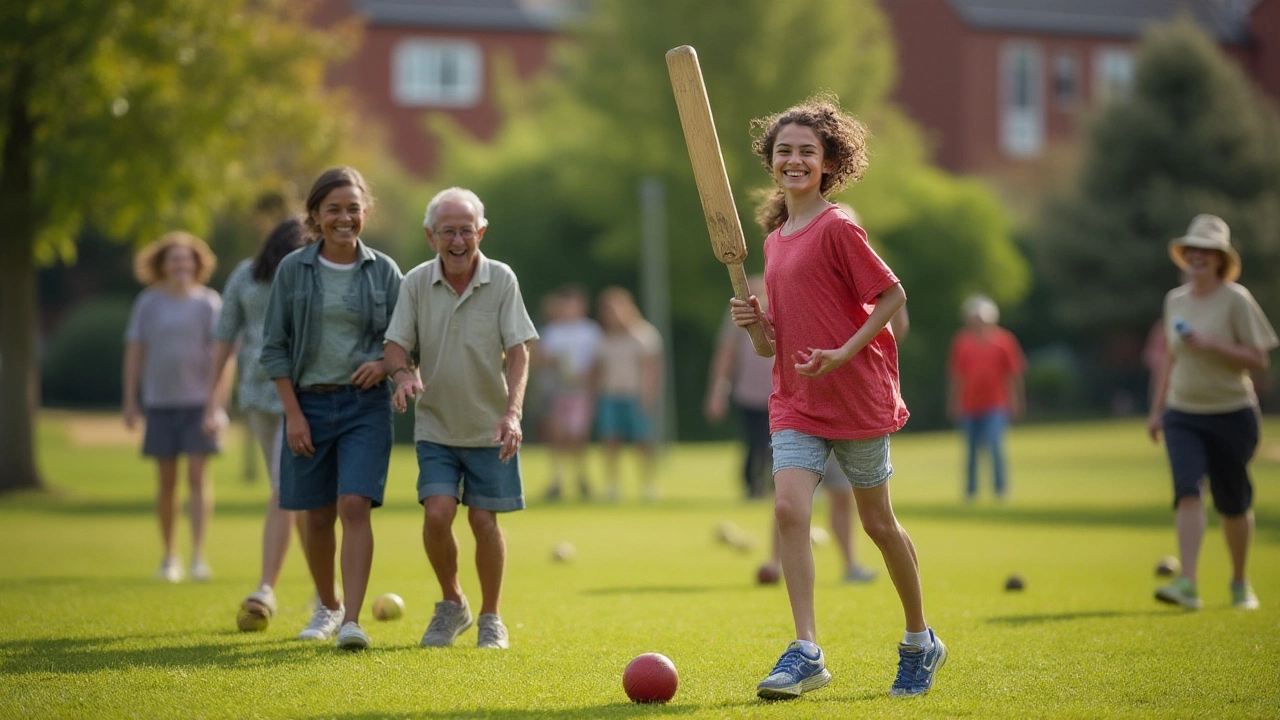How Adults Make Friends: Top Places and Smart Strategies in 2025
 Aug, 2 2025
Aug, 2 2025
Chances are, most adults know that finding new friends can feel downright weird after your mid-twenties. The playground rules don’t work anymore, and the bar scene, let’s face it, gets old fast. But adult friendship isn’t just about fun—it’s vital for mental and physical health. Want to live longer? Make more friends. Social ties have been linked to everything from lower stress to better heart health. But where are adults actually making friends these days? Some answers might surprise you.
The Workplace: Where Coffee Breaks Spark Connection
If you spend more hours at work than anywhere else, you’re far from alone. According to a Pew Research poll from 2024, 45% of adults say they made at least one close friend at their current workplace—and it isn’t just because of forced happy hours. Offices, hospitals, schools, retail—these spots are where adults see the same faces every day, so it’s no wonder little routines blossom into trust. Whether you’re commiserating over deadlines or trading stories by the coffee machine, shared challenges break the ice. The key? Repeated, casual interaction. The guy who always brings donuts or the colleague who asks about your weekend—they’re not just being polite; they’re laying the foundation for friendship.
Still, work friendships can be tricky to balance. Should you add your boss on social media? Invite a coworker out for brunch? The trick is to follow the vibe. If someone’s opening up naturally, take that as your green light. Be consistent—show up for group lunches, participate in team outings, and volunteer for projects. It’s these little connections that stack up. According to a Harvard Business Review article from January 2025, adults who engaged in breakroom banter or worked on cross-departmental projects were three times more likely to report having a “work best friend.” But work friends aren’t just for gossip—they’re associated with higher job satisfaction, lower stress, and even better performance at work.
For remote workers, the rules change. Creating friendships over Slack or Zoom is possible, but it takes effort. Join digital coffee chats, hop into casual channels about music or movies, and don’t be shy about asking a colleague for a virtual lunch. Introducing a personal touch, like showing your pet on camera or talking about your weekend plans, helps others open up, too. Work might be about business, but it can also be the quiet start of your next lifelong friendship.
Shared Interests: Hobby Groups and Classes as Friendship Factories
Hobbies are the cheat code for adult friendships. Think about it: It’s way easier to bond with someone who likes the same things you do. Recent data from Meetup’s annual trend report shows that hobby-based gatherings have seen a 30% jump in attendance since 2022. Cooking classes, language exchanges, yoga, book clubs—whatever your passion, there’s a group somewhere inviting newcomers in. The nice thing? You skip awkward small talk because everyone’s already talking about the activity you all enjoy.
Ever walked into a pottery class solo or clicked “join” on a hiking group’s event page? Turns out, you’re not the only one nervous; most folks are in the same boat. According to psychologist Miriam Kirmayer, adults make authentic friends quickest when they do things side by side—not just face-to-face. Shared projects and learning new skills together create natural bonds. Take Samantha from Manchester, who moved for her job and knew nobody. One salsa class later, she’d found not only a dance partner but a brunch crew, too.
Online hobby groups have exploded post-pandemic, but they still lead to real-world hangouts. Think Dungeons & Dragons servers, virtual art classes, or cycling Discord groups that set up city meetups. If you feel lost about where to start, ask yourself: What could I do for an hour and lose track of time? Try that. Don’t worry about being a pro. Most group members actually love helping newbies, and the casual, low-stakes vibe sets the stage for non-awkward introductions. Keep showing up—even if it feels weird the first time—and friendships will start to stick.

Community Volunteering: Kindness Breeds Connection
Helping out isn’t just about giving back—it’s a social shortcut. Studies in the Journal of Social Psychology show that volunteering leads to “significantly higher” levels of social connectedness and new friendships. Food banks, park cleanups, and community events are especially solid for meeting people from all walks of life. The magic? Everyone’s there on the same mission. Shared purpose, even for one afternoon, breaks down awkwardness fast.
Consider this: 2025 stats from Volunteering UK reveal that nearly 60% of new adult volunteers list “finding friends” among their top three reasons for signing up. Sure, there’s a good deed at the core, but there’s also a hunger for connection. Volunteering is the great equalizer—no dress code, no networking pressure, just people doing something good together. If you’re shy, grab a friend to join you. If you’re solo, look for recurring opportunities (monthly food drives, weekly animal shelter shifts), where familiar faces become regulars and polite chatters become actual friends.
If you’re in a city, local community centers or places of worship are hotspots for events and volunteering gigs. Sign up sheets, open calls, or group chats are easy ways to plug in. Even micro-volunteering, like joining neighborhood litter-picking days or helping at a local festival booth, can lead to new chats and connections. The bonus? Studies find that folks who volunteer report being happier and even physically healthier. Talk about a win-win.
Online Platforms Moving Offline: Digital Meets Real Life
Friendship isn’t just analog anymore. Apps and online platforms aren’t just for dating or memes—they’re for making friends on purpose. Platforms like Bumble BFF and Friender have blown up in popularity since 2021. A Bumble survey from late 2024 found that over 70% of users in their late twenties and thirties downloaded friend-making apps specifically after moving cities or missing the social circle from school days. The internet isn’t a replacement for real friendship—it’s a launchpad.
Here’s the trick with online friendship apps: set your intention, be authentic, and actually meet up. Lingering endlessly in DMs rarely builds a true bond. Trust is built in shared experiences: grabbing coffee, exploring a new brunch spot, or tackling a local festival. Want to up your odds? Specify your interests in your profile, reach out first, and suggest a simple, public meetup. Success stories are everywhere—new-arrivals WhatsApp groups in Berlin, knitting Discords in Toronto, or Pokémon Go walks in New York have all turned digital strangers into fast friends.
Beyond apps, local Facebook groups or subreddits around city or neighborhood activities often organize real-life get-togethers: trivia nights, dog park meetups, running clubs. Another tip: be open to low-pressure, short meetups—say, a walk in the park over lunch. People are busy, so don’t demand huge chunks of time up front. The more you try, the more connections happen. If a meetup feels awkward, give it another shot; the second hang is usually a lot smoother.

Bars, Faith Groups, and “Third Places”: Classic Spots That Still Work
Not every adult friendship starts with a “click here to join” button. The third place—the space beyond home and work—has always been a social networking goldmine. Think coffee shops, gyms, neighborhood bars, sports leagues, or even the dog park. Sociologists call these ‘third places’ the backbone of community life because you bump into people, strike up chats about daily routines, and see the same faces again and again. The local trivia night or that painting-and-pints event? Classic, low-stress friendship fodder.
But what about faith groups or places of worship? Statistically, these are some of the most reliable sites for adult friendships in the U.S. According to the National Congregations Study, 65% of regular attendees report having made at least two close friends through their church, mosque, or synagogue. Weekly routine, shared values, and strong traditions of hospitality mean that “how was your week?” becomes “let’s grab lunch after.” Religious holiday events or charity projects are a plus—lots of new faces paired with real reasons to talk.
Family ties don’t always cut it for fresh connections. If you’re not a fan of bars or religious gatherings, “third places” can mean anything from art studios to trivia leagues. The trick is consistency: frequent the same local spots, chat with staff, and show up at regular events. A 2023 study by the Urban Institute found that adults who stuck to one or two “third places” a week saw a 25% increase in their social networks within six months. It’s all about routine and being open to serendipity—sometimes the person making your coffee might just become your next friend.
adult friendship statistics say it all: real-life relationships don’t fall in your lap after college. Adults tend to make friends where there’s overlap—work, shared passions, helping others, or hanging out in community spaces. No magic formula, just a mix of showing up, vulnerability, and a little creative courage. If your friend circle feels a little dusty, maybe it’s time to join that salsa class, swap stories at a community event, or strike up a chat in the slow grocery line. You never know—the next friend for life might be seconds away.
| Setting | % of adults reporting at least 1 friend made |
|---|---|
| Workplace | 45% |
| Hobby Groups/Classes | 29% |
| Volunteering/Community Events | 18% |
| Online Platforms/Apps | 15% |
| Faith Groups/Religious Communities | 28% |
| “Third Places” (cafes, bars, parks) | 33% |
